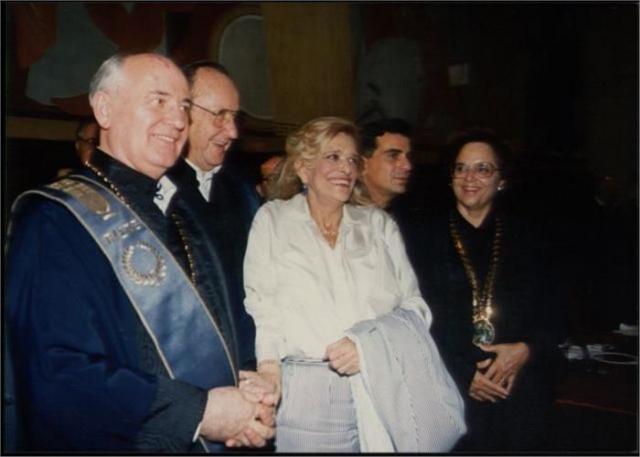Pictures: www.tanea.gr
From the summer of 1989 until the spring of 1990, PASOK lost three consecutive electoral battles and the power passed into the hands of Constantine Mitsotakis. At the meeting of the Central Committee, as well as at the countless caucuses, senior party cadres analysed the reasons for the loss. However, the explanation was simple. As Melina Mercouri told the founder of PASOK during a lunch: “Andreas, they do not like us anymore!”
This is not the superficial approach of an actress, but the insight of an experienced politician and it is as true as all the other theories of party leaders from the era.

Melina entered politics relatively late. But she did it with the same passion with which she did everything, and that is why she was so effective. In fact, she was the first and only minister of culture who left something tangible behind: in theatre and cinema, in books, in archaeological sites, and in the promotion of Greek culture and worldview. She succeeded simply because she was Melina. The only person who overpowered her in political elections was Antonis Tritsis in the municipal elections in 1990. In the negative climate for PASOK in this era, he prevailed as a New Democracy candidate and became mayor of Athens.
However, as a politician Melina had unique qualities. She holds a record as the minister of culture with the longest term of all time: from October 1981 until 6 March 1994 when she gave her last breath - the first woman buried with honours as for an acting prime minister in Greece.

Although she was a member of the Central Committee, many in PASOK were annoyed by her unconventional approach and did not consider her a politician, but a film star, who dealt with PASOK among other things. However, she wrote history in politics which no one else could. Not only in the period after 1981 - a period which was easy for the power, but also in difficult periods of its activity against the junta. No one else in politics has symbolized belligerent attitude, Hellenism and culture at the same time – only this woman whom the international press calls "The Last Greek Goddess."

Daughter of MP Stamatis Mercouris and granddaughter of Mayor of Athens Spiros Mercouris, she entered politics late – in April 1967. Manos Hatzidakis called her in America, where she was singing on Broadway, in order to tell her about the imposition of the dictatorship.
Without consulting with any political party – indeed, she was not in a relationship with any political party – she gathered the American media and made a statement against the junta.
As a punishment, the colonels deprived her of her Greek nationality - or at least so they thought. "I was born a Greek and I will die like a Greek, while Pattakos was born a fascist and will die a fascist," was her answer.
Active work against the dictatorship followed. Andreas Papandreou, Mikis Theodorakis and Melina were the most famous Greeks resisters internationally. She toured Europe and America, spearheading demonstrations and hunger strikes, organized concerts, sang, made fiery speeches at events and met political leaders with just a phone call. Her presence was enough in order to garner the attention of the media in each country, but at the same time this made her a target of the junta which tried to kill her at least three times.
During these years, a personal relationship with Andreas Papandreou was created, which made her probably the only person who had no difficulty in "opposing" him for everything: for his decisions, associates and wives, as well as for the party and the elections. Up to the end she was the only person who did not annoy him, even when she touched where it hurt: his right to determine, as founder of the party, the rules of the game for everyone else.
For example, in the autumn of 1990, after a health problem which forced him to stay longer in hospital, PASOK looked for someone who would take over the position of Secretary of the Central Commission instead of Akis Tsochatzopoulos nominated by Andreas Papandreou. No one dared to tell Papandreou not to insist. Melina visited him and told him "if you nominate Akis, we will nominate Paraskevas Avgerinos." He asked her "Who are you?", but took no action against her. Political turmoil never affected their relationship and it remained stable.

Melina also freely discussed family matters with him. She advised Dimitra Liani "Girl, if you love him, take him and go." Later, because of Andreas, she tried to create a new social circle around him and his new wife, who nevertheless perceived her as an enemy.
In 1974 Melina returned to Athens together with Papandreou and from the first moment joined PASOK and became a candidate member of the Piraeus region. "Me, an Athenian, in Piraeus?" she asked him. "You made Piraeus famous with the song ‘Children of Piraeus’ and they adore you," he told her in order to convince her. She lost the elections by 30 votes. In 1977 and 1981 she entered parliament.